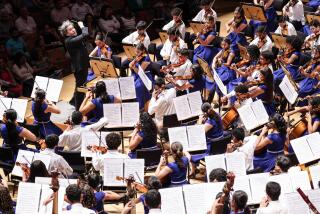Shostakovich’s soul laid bare
Dmitri Shostakovich started his searing Eighth String Quartet, which he inscribed “In memory of victims of fascism and war,” with four pitches that represent his name. This “motto” -- DSCH, or the notes D, E-flat, C and B -- is stated by each of the instruments in turn and occurs in all five movements.
Short of carrying a sign and parading in front of the Kremlin, it’s hard to imagine what more Shostakovich could have done to declare his real identity. Yet even now, despite this evidence and the staggering revelations in “Testimony: The Memoirs of Dmitri Shostakovich,” published in 1979, some people maintain that the composer was a docile son of a totalitarian regime.
The Eighth String Quartet was the blazing centerpiece of a Los Angeles Philharmonic Chamber Music Society Shostakovich concert Monday in Gindi Auditorium at the University of Judaism. Violinists Bing Wang and Chao-Hua Jin, violist Hui Liu and cellist Ben Hong showed why the composer’s beginning this work with his own name was something quite other than egotism.
Shostakovich wrote it quickly on a 1960 trip to Dresden to score a Soviet-East German film about the 1945 firebombing of that city. Drawing on those events and the siege of Leningrad, which he experienced, Shostakovich laid his nervous system bare.
There is not one moment of sentiment. An air raid of cinematic realism screamingly quotes a Jewish theme from Shostakovich’s E-minor Piano Trio. The theme embodies the Holocaust and all human suffering. The final movement, a long slow fugue based on the DSCH motto, ends grimly, with no hint of apotheosis. Death is final, even the composer’s. There is no room for anyone’s ego in this work, and the four Philharmonic players knew that and played it with masterly commitment.
Also on the program were the quartets Nos. 7 and 9. Such are the luxury resources of the Philharmonic strings that, with the exception of violist Liu, who played twice, each quartet was performed by a different group of instrumentalists.
Violinists Camille Avellano and Ingrid Kuo Chun, Liu and cellist Serge Oskotsky played the short but compact and elusive Seventh with intimacy and compelling urgency.
Violinists Akiko Tarumoto and Jonathan Wei, violist Meredith Snow and cellist Gloria Lum played the discursive, rhythmically tricky Ninth with wit and fierce energy.
More to Read
The biggest entertainment stories
Get our big stories about Hollywood, film, television, music, arts, culture and more right in your inbox as soon as they publish.
You may occasionally receive promotional content from the Los Angeles Times.










